9, April 2024
Dublin: Simon Harris pledges ‘new ideas, energy’ after becoming Ireland’s youngest PM 0
Lawmaker Simon Harris was elected Ireland’s prime minister by a vote in parliament Tuesday, becoming at 37 the country’s youngest-ever leader.
Harris takes over as head of Ireland’s three-party coalition government from Leo Varadkar, who announced his surprise resignation last month. Harris, who served as higher education minister in Varadkar’s government, was the only candidate to replace him as head of the center-right Fine Gael party.
Lawmakers in the Dáil, the lower house of Ireland’s parliament, confirmed Harris as taoiseach, or prime minister, by a 88-69 vote.
He was formally appointed to the post by President Michael D. Higgins in a ceremony at the president’s official residence in Dublin.
Harris was first elected to parliament at 24 and has been nicknamed the “TikTok taoiseach” – pronounced TEA-shock – because of his fondness for communicating on social media. He faces challenges including a strained health service, soaring housing costs and an exodus of Fine Gael lawmakers, more than 10 of whom have said they will not run for reelection.
“I commit to doing everything that I can to honor the trust that you have placed in me today,” Harris said. “As taoiseach I want to bring new ideas, a new energy and a new empathy to public life.”
Varadkar was the previous youngest-ever premier when first elected at age 38, as well as Ireland’s first openly gay prime minister. Varadkar, whose mother is Irish and father is Indian, was also Ireland’s first biracial taoiseach.
Varadkar, 45, has had two spells as taoiseach – between 2017 and 2020 and again since December 2022 as part of a job-share with Micheál Martin, the head of Fianna Fáil.
Varadkar officially stepped down on Monday when he handed in his letter of resignation to the president.
Varadkar told the Dáil on Tuesday that his time in politics had been the “most fulfilling and rewarding time” of his life.
“But today is the beginning of a new era for my party, a new chapter in my life and a new phase for this coalition government,” he said.
Harris has said he plans to keep the Fine Gael, Fianna Fáil and Green Party coalition government going until March 2025, when an election must be held.
Opposition parties argued that the Irish public deserves an early election.
“Another Fine Gael taoiseach is the last thing the people need,” said Mary Lou McDonald, leader of left-wing party Sinn Fein. “We need a change of leadership, we need a change of government.”
Source: AP
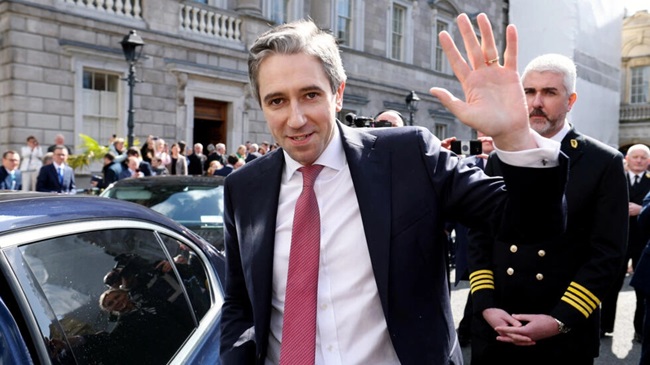

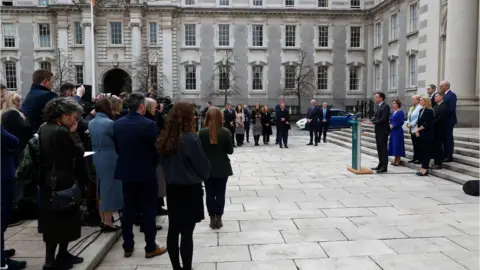 PA MediaMr Varadkar said he felt he was not the “best person for the job anymore”
PA MediaMr Varadkar said he felt he was not the “best person for the job anymore”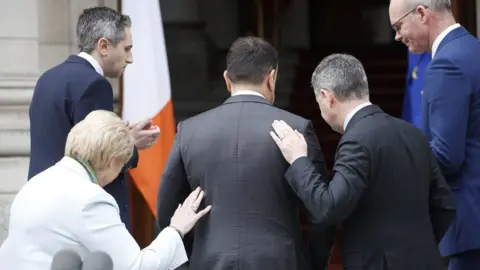 Nick Bradshaw
Nick Bradshaw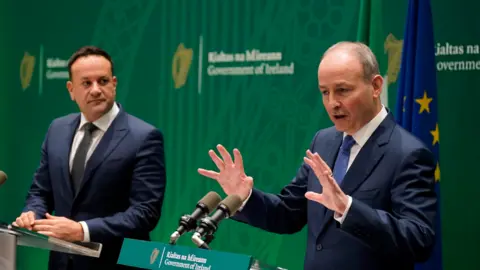 PA MediaMicheál Martin said he was “surprised” when he heard that Mr Varadkar was stepping down
PA MediaMicheál Martin said he was “surprised” when he heard that Mr Varadkar was stepping down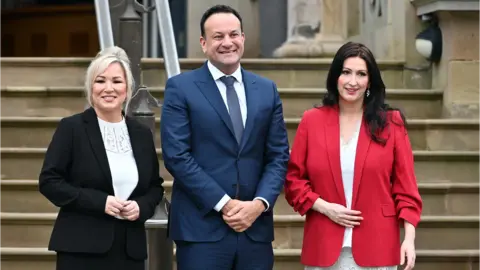 PA MediaFirst Minister Michelle O’Neill (left) called for a general election in the Republic of Ireland
PA MediaFirst Minister Michelle O’Neill (left) called for a general election in the Republic of Ireland
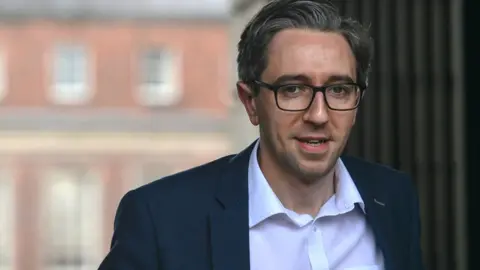 Getty ImagesHigher Education Minister Simon Harris is the early favourite with many bookmakers
Getty ImagesHigher Education Minister Simon Harris is the early favourite with many bookmakers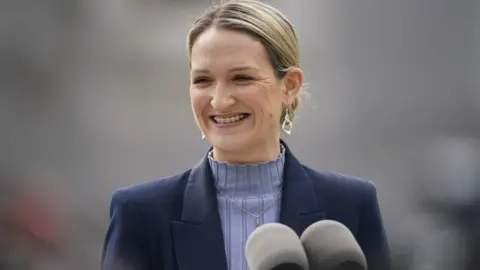 Niall CarsonAfter widespread disorder in Dublin last year, Helen McEntee faced down calls to resign from opposition parties
Niall CarsonAfter widespread disorder in Dublin last year, Helen McEntee faced down calls to resign from opposition parties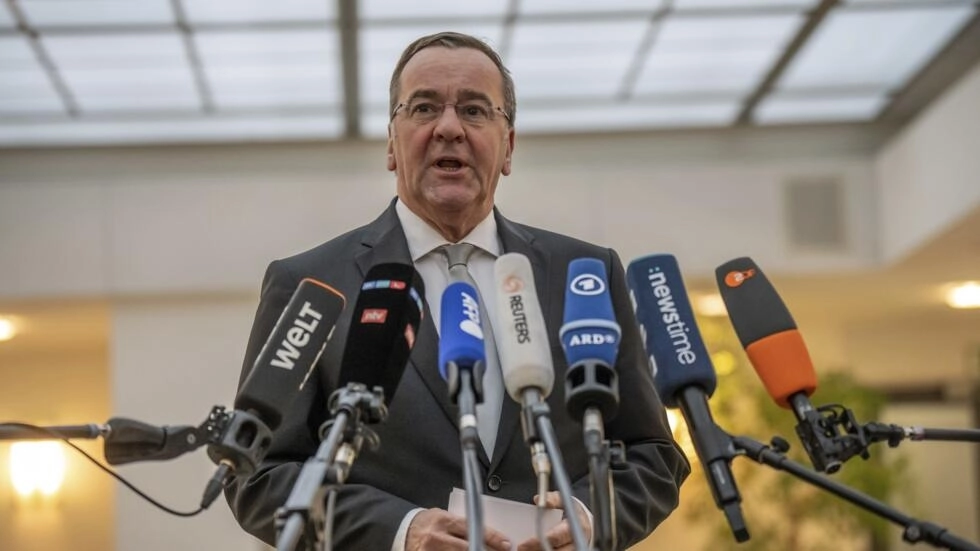

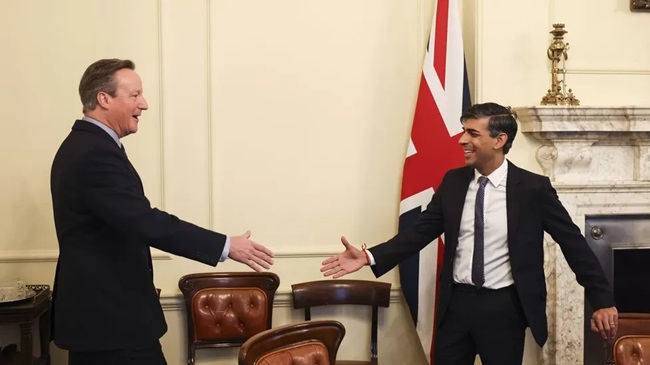
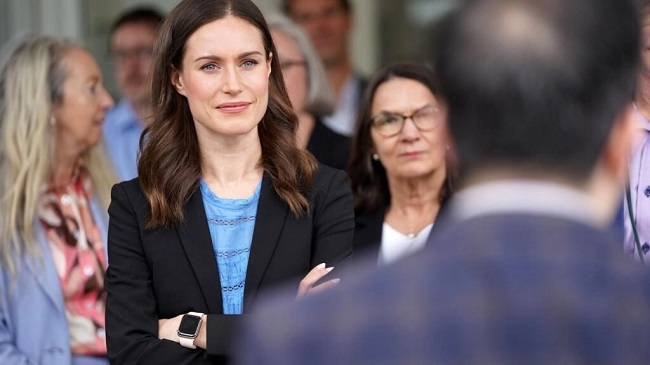

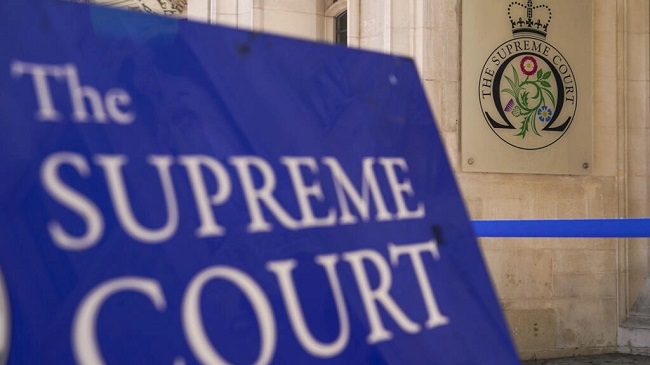
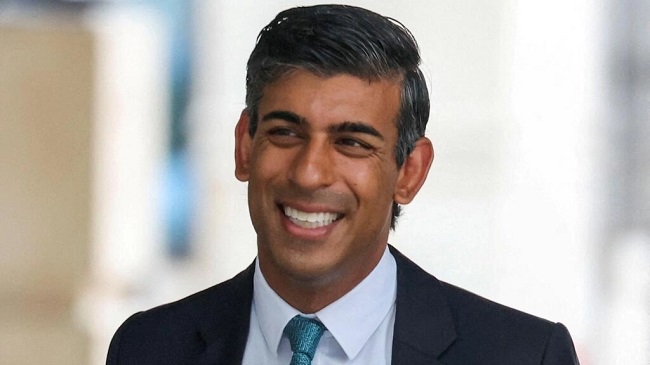

















4, May 2024
London: Labour’s Sadiq Khan easily wins record third term as mayor 0
London’s Labour mayor Sadiq Khan on Saturday secured a record third term, dealing the Conservatives another damaging defeat in their worst local election results in recent memory months before an expected general election.
Khan, 53, easily beat Tory challenger Susan Hall to scupper largely forlorn Tory hopes that they could prise the UK capital away from Labour for the first time since 2016.
The first Muslim mayor of a Western capital when first elected then, he had been widely expected to win as Labour surge nationally and the Conservatives suffer in the polls.
In the end, he saw his margin of victory increase compared to the last contest in 2021.
It adds to a dismal set of results for Prime Minister Rishi Sunak, as his Tories finished a humiliating third in local council tallies after losing nearly 500 seats in voting Thursday across England.
With Labour making huge gains, the beleaguered leader’s Conservatives lost crunch mayoral races in Manchester, Liverpool, Yorkshire as well as the capital and elsewhere.
In the West Midlands, where Tory incumbent Andy Street is bidding for his own third term, votes were reportedly being recounted and too close to call.
An unexpected Tory defeat there could leave Sunak with only one notable success: its mayor winning a third term in Tees Valley, northeast England — albeit with a vastly reduced majority.
‘Voters are frustrated’
Writing in Saturday’s Daily Telegraph, Sunak conceded “voters are frustrated” but insisted “Labour is not winning in places they admit they need for a majority”.
“We Conservatives have everything to fight for,” Sunak argued.
Labour, out of power since 2010 and trounced by Boris Johnson’s Conservatives at the last general election in 2019, also emphatically snatched a parliamentary seat from the Conservatives.
It seized on winning the Blackpool South constituency and other successes to demand a national vote.
“Let’s turn the page on decline and usher in national renewal with Labour,” party leader Keir Starmer told supporters Saturday in the East Midlands, where the party won the mayoral race.
Sunak must order a general election be held by January 28 next year at the latest, and has said he is planning on a poll in the second half of 2024.
Labour has enjoyed double-digit poll leads for all of Sunak’s 18 months in charge, as previous Tory scandals, a cost-of-living crisis and various other issues dent the ruling party’s standing.
On Thursday, they were defending nearly 1,000 council seats, many secured in 2021 when they led nationwide polls before the implosion of Johnson’s premiership and his successor Liz Truss’s disastrous 49-day tenure.
With almost all those results in by Saturday afternoon, they had lost close to half and finished third behind the smaller centrist opposition Liberal Democrats.
‘Impetus’
If replicated in a nationwide contest, the tallies suggested Labour would win 34 percent of the vote, with the Tories trailing by nine points, according to the BBC.
Sky News’ projection for a general election using the results predicted Labour will be the largest party but short of an overall majority.
Its by-election scalp in Blackpool — on a mammoth 26-percent swing — was the Conservatives’ 11th such loss in this parliament, the most by any government since the late 1960s.
Speculation has been rife in Westminster that restive Tory lawmakers could use the dire local election results to try to replace him. But that prospect seems to have failed to materialise.
However, it was not all good news for Labour.
The party lost control of one local authority, and suffered some councillor losses to independents elsewhere, due to what analysts said was its stance on the Israel-Hamas war.
Polling expert John Curtice assessed there were concerning signs for the opposition.
“These were more elections in which the impetus to defeat the Conservatives was greater than the level of enthusiasm for Labour,” he noted in the i newspaper.
“Electorally, it is still far from clear that Sir Keir Starmer is the heir to (Tony) Blair.”
Source: AFP